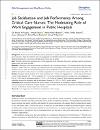Job Satisfaction and Job Performance Among Critical Care Nurses: The Moderating Role of Work Engagement in Public Hospitals.
| Author | Al-Fuqaha, Ola Naiem |
| Author | Rayan, Ahmad |
| Author | Baqeas, Manal Hassan |
| Author | Alqadrie, Wafaa Tawfiq |
| Author | Alhalaiqa, Fadwa |
| Author | Batiha, Abdul-Monim |
| Author | Rayani, Ahmad M |
| Available date | 2025-10-21T10:46:19Z |
| Publication Date | 2025 |
| Publication Name | Risk Management and Healthcare Policy |
| Identifier | http://dx.doi.org/10.2147/RMHP.S538291 |
| Citation | Al-Fuqaha ON, Rayan A, Baqeas MH, Alqadrie WT, Alhalaiqa F, Batiha AM, Rayani AM. Job Satisfaction and Job Performance Among Critical Care Nurses: The Moderating Role of Work Engagement in Public Hospitals. Risk Manag Healthc Policy. 2025;18:3311-3327 https://doi.org/10.2147/RMHP.S538291 |
| ISSN | 1179-1594 |
| Abstract | Nurses are pivotal to healthcare delivery, particularly in critical care settings where their performance directly affects patient outcomes. While job satisfaction and work engagement are established predictors of job performance, their interactive effects remain underexplored in low-resource and high-stress contexts such as Jordan. This study examined the moderating role of work engagement in the relationship between job satisfaction and job performance among critical care nurses in Jordan. A descriptive cross-sectional design was employed with a convenience sample of 143 registered nurses from four public hospitals in Jordan. Data were collected using validated instruments: Demographic and Professional Characteristics Sheet, The Job Satisfaction Survey (JSS), the Utrecht Work Engagement Scale (UWES-9), and the Six-Dimension Scale of Nursing Performance (SDSNP). Descriptive statistics, Pearson's correlation, independent t-tests, and moderation analysis were conducted using SPSS v26. Participants reported moderate levels of job satisfaction (M = 2.90/4), work engagement (M = 3.58/6), and job performance in terms of both frequency (M = 3.31/4) and quality (M = 3.11/4). Job satisfaction positively correlated with work engagement (r = 0.28, p < 0.001) and job performance quality (r = 0.21, p < 0.05), but not frequency. Work engagement significantly moderated the relationship between job satisfaction and job performance frequency (β = 0.25, p = 0.027), but not quality. Work engagement enhances the positive impact of job satisfaction on performance frequency, emphasizing its critical role in sustaining nurse productivity. Targeted strategies to improve both job satisfaction and engagement may enhance performance outcomes and healthcare quality in high-acuity environments. |
| Sponsor | The authors of this study extends his appreciation to the Researchers Supporting Project Number (RSPD2025R1032), King Saud University, Riyadh, Saudi Arabia. The authors would like to thank the nursing departments and nurse managers in the participating hospitals for their support, as well as all the nurses who participated in the study. The authors acknowledge the partial funding from deanship of scientific Research at Zarqa University. Authors Also extend their appreciation to the deanship of Scientific Research at Northern Border University, Arar, KSA, for partial funding. |
| Language | en |
| Publisher | Dove Medical Press Ltd |
| Subject | ICU job performance job satisfaction nursing work engagement |
| Type | Article |
| Pagination | 3311-3327 |
| Volume Number | 18 |
Files in this item
This item appears in the following Collection(s)
-
Nursing Research [125 items ]


